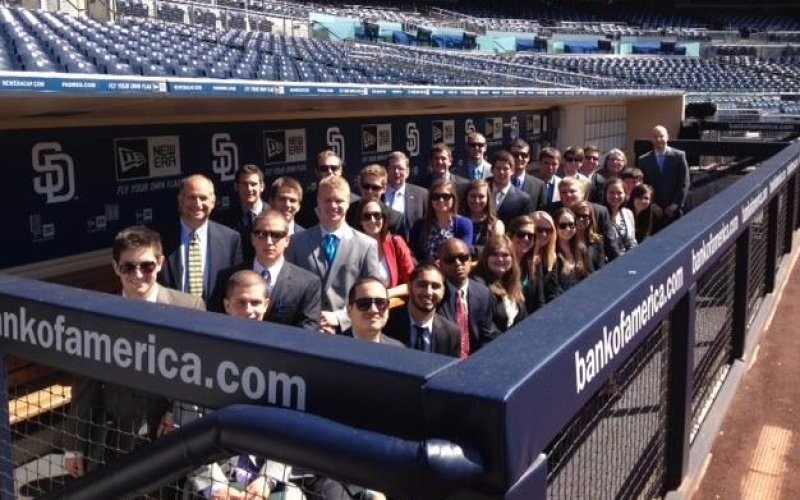In the 1980s, only three higher education institutions had sports management programs in the United States. Flash forward through a "Jerry Maguire" movie, billion-dollar sports franchise sales, and 25 million American viewers tuning into the 2014 World Cup, and you have a 3,000-percent growth in sports management programs throughout the country.
 Members of DePaul's sports management program fill the dugout at Petco Park, home of the San Diego Padres. A partnership with the baseball franchise allows students to experience a two-week course working with the team's marketing department.
Members of DePaul's sports management program fill the dugout at Petco Park, home of the San Diego Padres. A partnership with the baseball franchise allows students to experience a two-week course working with the team's marketing department.
Among the 300 such programs that exist today, what makes DePaul's sports management MBA concentration stand out? Proximity and professionalism, says Andrew Clark, director of sports management programs at the Driehaus College of Business. The program is also spearheaded by Richard Rocco, assistant professor of marketing.
"What makes DePaul unique is where we sit" in the heart of Chicago, Clark says, and the program's industry connections. "We can take my class to Soldier Field and they will spend two hours with the Chicago Bears staff. The speakers we are able to bring in from the Cubs, Blackhawks, the White Sox and other professional sports organizations based here in Chicago allow us to easily integrate the real-world challenges and benefits of the sports industry into my classes. Soldier Field is literally a mile and a half away."
Creating Franchise Players
Clark says students studying sports management at DePaul learn three important lessons: how the sports industry actually operates, how to start a career in the sports industry, and transferable business skills for management positions in sports or any other industry.
Growing up in the 1990s in Skokie Ill., Wahaj Tariq (BS '11) certainly had a double dose of Chicago Bulls fever. But he didn't have the height or the talent of Michael Jordan, so his NBA dreams were dashed until he discovered sports marketing in high school. While majoring in management at DePaul, he focused on sports management and began working at local sports franchises.
At first, his parents weren't exactly thrilled. His father, a college-educated Pakistani immigrant, expected that Tariq would study medicine or law, or be a pharmacist like his older sister.
"That was a hard conversation. It was a tough sell," Tariq says. "I had to educate them a little bit about the industry." And when he began working a non-paid intern, his parents became even more worried. But Tariq says, thanks to DePaul, he knew that internships were part of the winning formula for landing jobs in the sports industry. He eventually landed paid jobs at the Chicago Bears and Chicago Blackhawks while in school.
"I learned from the speakers that would come to DePaul that if you did the internship and worked the grunt work and put yourself out there, an opportunity can present itself," Tariq says. "The sports business community is so small, it's rare to get hired without prior experience."
Nearing graduation in 2011, Tariq got the call from the National Football League. He was one of only seven graduates selected from more than 2,200 applicants for the NFL's coveted and exclusive two-year Junior Rotational Program.
Tariq, now a marketing manager for the Oakland Raiders, says it was his experience with Chicago sports franchises, including the Chicago Bears that helped him outshine even Ivy League graduates. This experience, he says, came directly from his classes at DePaul.
Taking Sports Seriously
Tariq is among a growing group of DePaul students and alumni who are working in the operations offices of some of the nation's top sports franchises and agencies. From the Chicago Cubs to the Dallas Cowboys and New York Islanders, DePaul is quickly gaining a reputation as a place to recruit top sports management talent.
Bryan Robinson, vice-president of Human Resources for the Chicago Cubs, says DePaul's sports management program is "vital" and uniquely fitted for the real-world of sales and marketing in sports. Currently, the Chicago Cubs has about 10 DePaul graduates or students working within the organization.
He says students who emerge from this program, especially Rocco's sales and marketing classes, are "all extremely well prepared and understand, without a doubt, what sales is all about," says Robinson. "The fundamental training that has been given to them by the sports management program has been really robust. They have just been extremely well prepared."
Robinson says DePaul students have a firm grasp of what it takes to succeed in the business of sports and are not taken off guard when they come into a high-volume, high-pressure sales environment that exists at many major league organizations such as the Cubs.
Clark says it's important to teach students the business skills that they need to succeed, inside or outside the sports industry. Sports is, foremost, a revenue-generating vehicle, and the industry is expected to gross more than $143 billion by 2015. Its executives are looking for staff members who can help them operate profitably.
"Sports executives want to see transferable skills, they don't want just fans," he says. "They want to see how your skills fit the roles they have within their organization."
Tariq says DePaul's program prepared him p for his current sports management career. The required group projects, the countless hours spent interning at professional sports teams, the one-on-one talks with Chicago sports management professionals all helped him chart a path for success. "You have to basically put yourself out there and go grab the opportunity," he says.
Tariq says his parents are now gratified with his career choice. "When their friends or co-workers ask them what I'm doing with my life, they tell them, 'he works for the NFL.'"